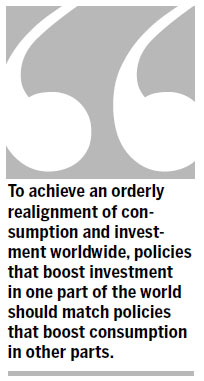Tectonic shifts in world economy
Updated: 2013-01-23 07:23
By Zhu Min (China Daily)
|
|||||||||||

Global coordination can reduce instability and maximize the benefits from fundamental changes in structure
Whether we like it or not, the world around us is in a state of constant change. But recent economic trends suggest that this change may be shifting its direction in a fundamental way.
Consider the advanced economies. During the last two decades, economic growth in these countries was led by consumption - so much so that economic activity in these economies swung from investment to consumption by a total of 10 percentage points of GDP. As a result, in 2010 the share of consumption in their GDP had reached 81.6 percent.
Meanwhile, emerging markets and developing economies provided almost a mirror image of this trend, raising their investment and boosting the supply of goods to the rest of the world at the cost of consumption in their own economies. By 2010, the share of consumption in their GDP had declined, from 73.4 percent to 67.1 percent.
Looking forward, it is unlikely that the consumption share of GDP can increase further in advanced economies. The main drivers of this increase were primarily financial engineering and wealth effects from strong asset prices. Neither of these factors is currently at play to push consumption's share of GDP higher.
But can the advanced economies' consumption even be sustained at the current level? Perhaps not. Current levels of consumption are associated with over-extended governments and households, whose debt levels remain high, implying that more savings are required. Banks also need to raise capital. In general, many economic agents need an extended period of deleveraging.
However, current policies in the major advanced economies are aimed at maintaining current consumption levels in order to support growth and employment. If the consumption share of GDP nonetheless declines, simple arithmetic tells us that investment and exports need to be higher to maintain total demand.
Should we expect emerging markets and developing economies to pick up the slack? To sustain strong growth in these economies as external demand weakens, domestic demand needs to become the major engine of growth. This means stronger domestic consumption and appropriate levels of investment to support such consumption growth. In economies where investment levels are leading to excess capacity, resources could shift from investment to consumption, provided that these countries' external accounts remain sustainable.
These are major tectonic shifts in the structure of the global economy, and are fraught with potential dangers. The pace of change will vary between sectors and across economies, leading to mismatches of demand and supply worldwide.
Moreover, with globalization, an economic problem in one part of the world can be transmitted to the rest of the world more strongly, substantially complicating policy responses in both advanced and developing economies. A study of such spillover effects by the International Monetary Fund suggests that, before the global financial crisis, external factors explained 36 percent of change in output in the five systemically important economies (the eurozone, the United States, China, Japan, and the United Kingdom); after the crisis, however, this share reached close to 60 percent. In the rest of the world, including emerging markets, the share of external factors in output change increased from about 43 percent to more than 60 percent.
In this environment, we must diligently pursue policy coordination at the global level. To achieve an orderly realignment of consumption and investment worldwide, policies that boost investment in one part of the world should match policies that boost consumption in other parts.
In particular, advanced economies should implement fundamental reforms that enhance productivity, the eurozone should strengthen the currency union, and emerging markets and developing economies should boost their domestic sources of growth. And these policies should be consistent with fiscal and external stability. Moreover, financial-sector policies and regulatory frameworks should be coordinated at the global level, in order to design and implement consensus-based rules, thereby addressing the problems posed by very large, global institutions that are considered too big or too complex to fail.
Only with such global coordination can we reduce, and possibly eliminate, economic instability and disorderly adjustments both at home and abroad, even as we seek to maximize the benefits of the inevitable changes in the global economy.
Project Syndicate
The author is deputy managing director of the IMF and a former deputy governor of the People's Bank of China.
(China Daily 01/23/2013 page8)
Today's Top News
Police continue manhunt for 2nd bombing suspect
H7N9 flu transmission studied
8% growth predicted for Q2
Nuke reactor gets foreign contract
First couple on Time's list of most influential
'Green' awareness levels drop in Beijing
Palace Museum spruces up
Trading channels 'need to broaden'
Hot Topics
Lunar probe , China growth forecasts, Emission rules get tougher, China seen through 'colored lens', International board,
Editor's Picks

|

|

|

|

|

|





